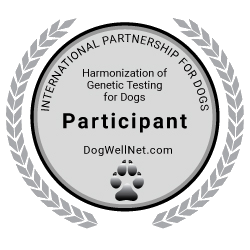L-2-hydroxyglutaric aciduria (L-2-HGA)
Disease
L-2-HGA (L-2-hydroxyglutaric aciduria) in Staffordshire Bull Terriers is a neurometabolic disorder characterised by elevated levels of L-2-hydroxyglutaric acid in urine, plasma and cerebrospinal fluid.
L-2-HGA affects the central nervous system, with clinical signs usually apparent between 6 months and one year (although they can appear later). L-2-HGA produces a variety of neurological deficits, including psychomotor retardation, seizures and ataxia. Symptoms are "wobbly" gait, tremors, muscle stiffness as a result of exercise or excitement and altered behaviour.
Breed
Staffordshire Bull Terrier
Trait of inheritance
Test duration
3-5 days after arrival of the sample in the lab
Material
The DNA test is performed out of EDTA blood or buccal swabs. Required swabs can be ordered free of charge. (Buccal swab order-form). If a swab is sent in, possibly the genetic material is not sufficient to run the test. In this case it would be best to send in an EDTA blood sample.
Testing procedure
Please send in your sample together with the lab order genetic. Results will be transmitted optionally via post, fax or email. After completion of the test you will receive a separate invoice. Payment can be made via credit card or bank transfer.
Breeding club discounts apply if a copy of the membership card is sent together with the respective samples. Due to administrative reasons the invoiced price can not be altered subsequently.
Questiones?
Please contact our molecular biology team for further questions.
LABOKLIN GmbH und Co.KG
Steubenstraße 4
D-97688 Bad Kissingen
Telefon: +49 (0)971 72020
Fax: +49 (0)971 68546
E-Mail: info@labogen.com
Links
*) Partnerlaboratory


